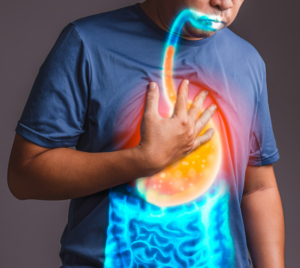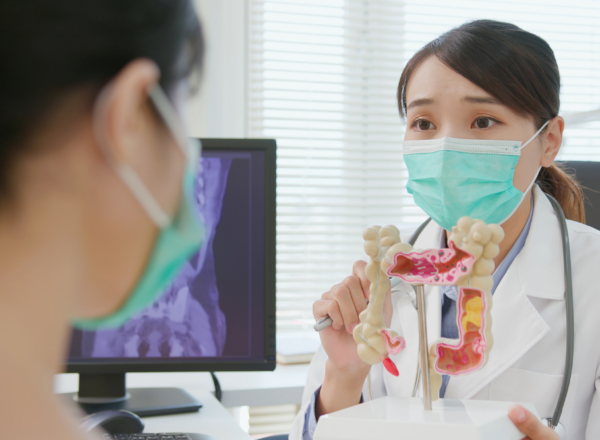Acid reflux: Regurgitation causes and treatment methods
Regurgitation causes and treatment methods should be handled by a professional gastroenterologist
Acid reflux: Regurgitation causes and treatment methods
Regurgitation causes and treatment methods should be handled by a professional gastroenterologist
Acid regurgitation or gastroesophageal reflux (GERD) occurs when the contents of your stomach move back up into the oesophagus.
This causes an uncomfortable, burning sensation in your chest which can move into your neck and chest. This is commonly known as heartburn.
There’s no single cause that promotes acid reflux. You can, however, be at risk of developing this condition if you’re:
- Living with obesity
- Pregnant
- Excessively drinking sodas, coffee, or alcohol
- Consuming large meals regularly
- Smoking

Acid regurgitation or gastroesophageal reflux (GERD) occurs when the contents of your stomach move back up into the oesophagus.
This causes an uncomfortable, burning sensation in your chest which can move into your neck and chest. This is commonly known as heartburn.
There’s no single cause that promotes acid reflux. You can, however, be at risk of developing this condition if you’re:
- Living with obesity
- Pregnant
- Excessively drinking sodas, coffee, or alcohol
- Consuming large meals regularly
- Smoking

Symptoms and causes of regurgitation
If you’re experiencing acid reflux, you may begin to display the following symptoms that are typical of GERD:
- Chest pain
- Nausea
- Pain and difficulty in swallowing
- Chronic cough
- Bad breath

When the lower oesophageal sphincter muscle at the end of your oesophagus doesn’t function properly, it can allow digestive acids and stomach contents to rise back up. Other causes include:
- Eating large meals regularly
- Lying down soon after eating a large meal
- Having hiatal hernia



If you’re experiencing acid reflux, you may begin to display the following symptoms that are typical of GERD:
- Chest pain
- Nausea
- Pain and difficulty in swallowing
- Chronic cough
- Bad breath



When the lower oesophageal sphincter muscle at the end of your oesophagus doesn’t function properly, it can allow digestive acids and stomach contents to rise back up. Other causes include:
- Eating large meals regularly
- Lying down soon after eating a large meal
- Having hiatal hernia





Diagnosis of regurgitation
Once you’ve consulted your physician regarding the symptoms you’ve been experiencing, you’ll be recommended to take the following tests to accurately diagnose your condition:
- Upper endoscopy: To examine the oesophagus and if required, to collect tissue for a biopsy
- Oesophogram: It is an imaging test that’s conducted to examine your upper digestive tract
- Oesophageal manometry: It is done to measure the strength of your oesophageal muscles
- Oesophageal pH monitoring: To examine how acid has regulated in your body
Treatment methods of regurgitation
Once your physician has diagnosed your symptoms to be the cause of acid reflux, you may be given various treatment options depending on the severity of your condition.



When determining regurgitation causes and treatment, if it’s a mild case, the following lifestyle changes can be applied:
- Quit smoking
- Wait a few hours before lying down after a meal
- Avoid heavy meals at night
- Elevate your head when sleeping



Medication may be prescribed to relieve your discomfort:
- Antacids for mild acid reflux
- H2 receptor blockers to lower the production of stomach acids



Very severe cases of GERD may require the following surgeries:
- Fundoplication is where the top of your stomach is sewn around the oesophagus
- Bariatric surgery is where excess fat is removed if the cause of GERD is obesity
Diagnosis of regurgitation
Once you’ve consulted your physician regarding the symptoms you’ve been experiencing, you’ll be recommended to take the following tests to accurately diagnose your condition:
- Upper endoscopy: To examine the oesophagus and if required, to collect tissue for a biopsy
- Oesophogram: It is an imaging test that’s conducted to examine your upper digestive tract
- Oesophageal manometry: It is done to measure the strength of your oesophageal muscles
- Oesophageal pH monitoring: To examine how acid has regulated in your body
Treatment methods of regurgitation
Once your physician has diagnosed your symptoms to be the cause of acid reflux, you may be given various treatment options depending on the severity of your condition.



When determining regurgitation causes and treatment, if it’s a mild case, the following lifestyle changes can be applied:
- Quit smoking
- Wait a few hours before lying down after a meal
- Avoid heavy meals at night
- Elevate your head when sleeping



Medication may be prescribed to relieve your discomfort:
- Antacids for mild acid reflux
- H2 receptor blockers to lower the production of stomach acids



Very severe cases of GERD may require the following surgeries:
- Fundoplication is where the top of your stomach is sewn around the oesophagus
- Bariatric surgery is where excess fat is removed if the cause of GERD is obesity
Complications of acid reflux
If you fail to seek the appropriate medical assistance or fail to follow the prescribed treatment measures, it may lead to more serious health complications such as:
- Barrett’s oesophagus, which can cause permanent damage to the oesophagus
- Oesophageal cancer, which may affect people with Barrett’s oesophagus
- Gum disease and tooth enamel erosion
- Oesophagitis, which may cause your oesophagus to become inflamed



Complications of acid reflux
If you fail to seek the appropriate medical assistance or fail to follow the prescribed treatment measures, it may lead to more serious health complications such as:
- Barrett’s oesophagus, which can cause permanent damage to the oesophagus
- Oesophageal cancer, which may affect people with Barrett’s oesophagus
- Gum disease and tooth enamel erosion
- Oesophagitis, which may cause your oesophagus to become inflamed



FAQ
What factors contribute to regurgitation in acid reflux?
Obesity, pregnancy, hiatal hernia, particular foods and drinks (such as fatty or spicy foods, caffeine, and alcohol), smoking, and specific medications are just a few of the variables that might cause regurgitation.
Can regurgitation be a sign of other underlying illnesses?
Yes, regurgitation can be a symptom of various conditions such as gastroparesis, achalasia (a disorder of the oesophagus), or a structural abnormality in the upper digestive tract.
Are there any herbal treatments for acid reflux regurgitation?
By making lifestyle adjustments, such as avoiding trigger foods, chewing gum to increase saliva production, and ingesting aloe vera juice or slippery elm to relax the oesophagus, some people experience relief from regurgitation. However, before turning only to natural therapies, it’s important to get medical advice.
Consult a gastroenterologist to find out your regurgitation causes and treatment plan
An expert gastroenterologist can prescribe the necessary treatment measures to ease any discomfort that you might be feeling due to acid reflux.
Schedule an appointment with a specialist today for a timely diagnosis and suitable treatment plan.

